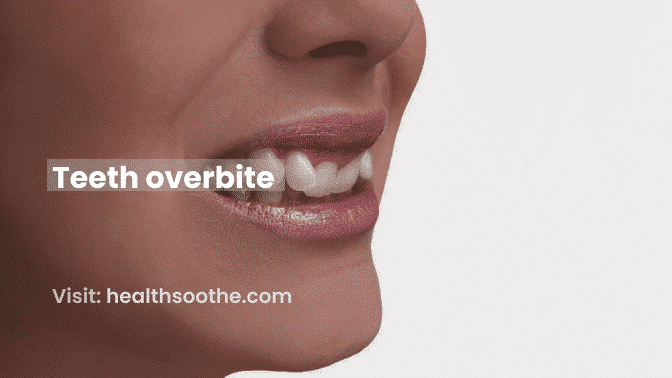Have you ever been self-conscious about your smile because your upper teeth stick out further than your lower teeth? This is a common dental condition called an overbite. An overbite, also known as a malocclusion, is when the upper front teeth protrude beyond the lower front teeth. While many people have slight overbites, a significant overbite can cause dental health problems and cosmetic concerns.
In this article, we’ll explore what causes an overbite, the different types of overbites, how to diagnose it, the risks of untreated overbite, common treatment options, tips to prevent overbite, and when to see a dentist.
What is a teeth overbite?
An overbite is a dental condition where the upper front teeth overlap with the lower front teeth. Ideally, the upper front teeth should rest on top of the lower front teeth, and the upper and lower teeth should fit together properly. However, in an overbite, the upper front teeth extend beyond the lower front teeth. An overbite is measured in percentages of how far the upper teeth extend beyond the lower teeth.
Read Also: 4 Major Problems You Can Face Due to Misaligned Teeth
What causes a teeth overbite?
Several factors can cause an overbite, such as:
- Genetics: One of the most common causes of an overbite is genetics. If a person’s parents or close relatives have an overbite, they are more likely to develop one as well.
- Thumb-sucking or pacifier use in children: When children suck their thumbs or use pacifiers for a prolonged period, it can cause the upper front teeth to protrude, leading to an overbite.
- Tongue thrusting: Tongue thrusting is the habit of pushing the tongue forward against the front teeth during swallowing or speaking. Over time, this can cause the upper teeth to move forward, resulting in an overbite.
- Misaligned jaw or temporomandibular joint disorder (TMJ): A misaligned jaw or TMJ disorder can cause the upper and lower teeth to not fit together properly, leading to an overbite.
- Missing teeth: When a person loses one or more teeth, the remaining teeth may shift or move to fill the gap, causing an overbite.
It’s important to note that some people may have a combination of these causes that contribute to their overbite. If you suspect you have an overbite, it’s important to see a dentist for a proper diagnosis and treatment plan.
Different types of overbites
There are two types of overbites:
- Dental overbite: When the upper front teeth protrude because of the way the teeth are positioned.
- Skeletal overbite: When the upper jaw bone is larger than the lower jaw bone, causing the upper front teeth to stick out further.
Symptoms of a teeth overbite
Some common symptoms of a teeth overbite include:
- A prominent upper jaw or front teeth.
- Difficulty biting or chewing food.
- Speech problems.
- Jaw pain or discomfort.
- Chronic headaches.
How to diagnose a teeth overbite?
Your dentist can diagnose an overbite during a routine dental check-up. They may use several methods to diagnose the overbite, such as:
- X-rays: To determine the extent of the overbite.
- Dental impressions: To create a mold of your teeth and mouth.
- Bite analysis: To measure the angle of your bite and how your teeth fit together.
The risks of untreated overbite
If left untreated, an overbite can lead to several dental health problems, such as:
- Gum disease: An overbite can cause difficulty cleaning teeth, which can lead to gum disease.
- Tooth decay: Difficulty cleaning teeth can also lead to tooth decay.
- TMJ disorders: An overbite can cause TMJ disorders and chronic jaw pain.
- Speech problems: An overbite can cause difficulty speaking clearly.
Common treatment options for overbite
Fortunately, there are several treatment options for correcting an overbite, such as:
- Orthodontic treatment: Braces or clear aligners can help shift teeth into the proper position and correct the overbite.
- Tooth extraction: If overcrowding is causing the overbite, your dentist may recommend tooth extraction to create space.
- Surgery: In severe cases, orthognathic surgery can be performed to reposition the upper jaw and correct the overbite.
Aftercare for overbite treatment
After overbite treatment, your dentist will provide instructions for aftercare, such as:
- Wearing a retainer: After orthodontic treatment, you’ll need to wear a retainer to prevent the teeth from shifting back to their original position.
- Eating soft foods: After surgery, you’ll need to eat soft foods for a period of time to allow for proper healing.
- Maintaining good oral hygiene: It’s essential to brush and floss regularly to prevent gum disease and tooth decay.
Tips to prevent overbite
While some causes of an overbite, such as genetics, cannot be prevented, there are some ways to reduce the risk of developing an overbite, such as:
- Avoid thumb-sucking or pacifier use in children.
- Encourage proper tongue positioning and swallowing.
- Seek orthodontic treatment early on to correct any misaligned teeth or jaw problems.
When to see a dentist
If you notice any symptoms of an overbite, such as difficulty biting or chewing, speech problems, or chronic jaw pain, it’s important to see a dentist for a diagnosis and treatment plan. Additionally, if you’re concerned about the appearance of your smile, your dentist can offer cosmetic options, such as veneers or bonding, to improve the look of your teeth.
Conclusion
An overbite is a common dental condition that can cause dental health problems and cosmetic concerns. Fortunately, there are several treatment options available to correct an overbite, such as orthodontic treatment, tooth extraction, or surgery.
If you’re concerned about an overbite, talk to your dentist about your treatment options and aftercare instructions. By taking care of your teeth and seeking early treatment, you can improve your dental health and confidence in your smile.
Q1: What is a teeth overbite?
A1: A teeth overbite is a condition in which the upper front teeth overlap excessively with the lower front teeth when the mouth is closed.
Q2: What are the causes of teeth overbite?
A2: Teeth overbite can be caused by a variety of factors, including genetics, prolonged thumb-sucking or pacifier use during childhood, jaw misalignment, and missing teeth.
Q3: Can teeth overbite cause any health problems?
A3: Yes, if left untreated, teeth overbite can lead to a range of health problems, including headaches, jaw pain, difficulty chewing, and even speech problems.
Q4: How is teeth overbite treated?
A4: Treatment for teeth overbite depends on the severity of the condition. Mild cases may require no treatment, while more severe cases may require orthodontic treatment, such as braces, or even jaw surgery in extreme cases.
Q5: Can teeth overbite be prevented?
A5: While genetics play a role in teeth overbite, there are steps that can be taken to reduce the risk of developing this condition, including early orthodontic intervention, avoiding prolonged thumb-sucking or pacifier use, and maintaining good oral hygiene.





